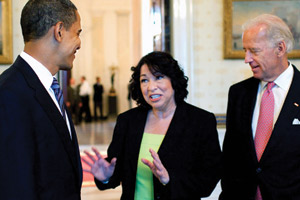Conservative blogger and columnist Rod Dreher was initially bothered by Supreme Court nominee Sonia Sotomayor’s comment that she “would hope that a wise Latina woman with the richness of her experiences would more often than not reach a better conclusion than a white male who hasn’t lived that life.”
Then he read the context.
Dreher and other conservatives had been aghast at those 30-odd words ever since Stuart Taylor, Jr. pointed to them in a National Journal column over the weekend. At issue is the accusation that Sotomayor is, in Rush Limbaugh’s words, “a reverse racist” who thinks that Latina judges have some special insight that they can and should use that makes them better than white male judges.
Sotomayor, who said those words in a speech at the University of California, Berkeley, in 2001, was actually making a very different point. Sotomayor said that, “Whether born from experience or inherent physiological or cultural differences… our gender and national origins may and will make a difference in our judging.” She hoped that, in cases about “race and sex discrimination,” a wise Latina’s background and experiences might help her produce a better result than a white man who “hasn’t lived that life.” In context, it’s clear Sotomayor is simply acknowledging that personal experiences inevitably affect judges’ outlooks and hoping that they affect judges’ decisions for the better. Having read the whole speech, Dreher explains what the broader point was:
Taken in context, the speech was about how the context in which we were raised affects how judges see the world, and that it’s unrealistic to pretend otherwise. Yet—and this is a key point—she admits that as a jurist, one is obligated to strive for neutrality. It seems to me that Judge Sotomayor in this speech dwelled on the inescapability of social context in shaping the character of a jurist. That doesn’t seem to me to be a controversial point.
That’s because it isn’t a controversial point. Dreher goes on to say he’s “relieved” by this section of Sotomayor’s speech, because it strikes him as “both idealistic and realistic”:
While recognizing the potential effect of individual experiences on perception, Judge Cedarbaum nevertheless believes that judges must transcend their personal sympathies and prejudices and aspire to achieve a greater degree of fairness and integrity based on the reason of law. Although I agree with and attempt to work toward Judge Cedarbaum’s aspiration, I wonder whether achieving that goal is possible in all or even in most cases.
It’s great that Dreher has come around. Unfortunately, the blindingly obvious realization that a judge’s personal experiences unavoidably affect her perspective is far from obvious to many of his friends on the right. References to “empathy” and “feelings” have become common right-wing buzzwords for what judges must not have. This is both politically stupid—presumably most Americans think empathy is a good thing—and profoundly unrealistic. It may be hard to believe, but Antonin Scalia, Samuel Alito, and John Roberts have feelings and experiences, too, and those affect their decisions. George H.W. Bush cited Clarence Thomas’ “great empathy” when he appointed Thomas to the court. A judge’s duty is to be neutral. He or she doesn’t have to be a robot.
Also, people should read the full context of things they plan to comment on before commenting on them.















